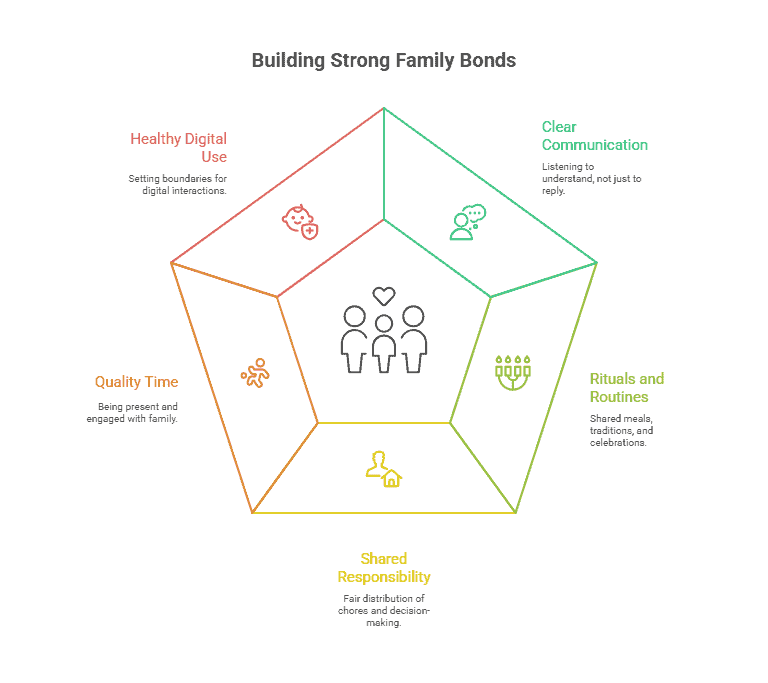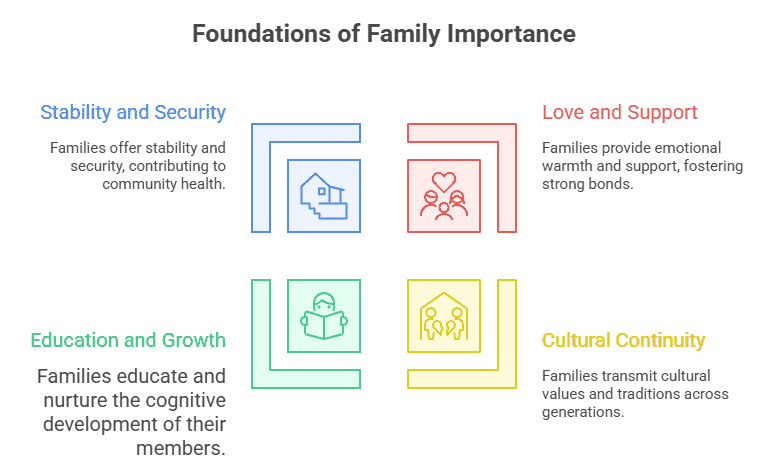The founding premise of a human life is constituted by the family; under this perspective, families give shape to individuals and communities alike. Within the family, values are given down from one generation to another, identities are forged, and support systems are created. If you ask how is family important to society, the short answer is: Families provide love, cultural continuity, education, and stabilization. Strong families develop strong individuals who become healthy, secure, and happy communities.

Why Talk About Family Today?
Life moves on fast. Technology, perhaps, even manages to cause some family dinners. Yet, no matter how much technology grows, one truth remains unmoved: Family is the foundation. It is the first classroom, the cheering squad for a lifetime, and sometimes the only laughing buddy for half a century on the same inside joke. When we speak about the world’s success, we can’t very well neglect the role that families play in its making.
What Do We Mean by “Family” Today?
Modern definitions that matter
Family is no longer the traditional two-parent and children setup. It may include blended families, single-parent homes, adoptive families, and even families created through bonds stronger than biology. They all share love, responsibility, and belonging.
Family vs. household
Not every household is a family, but every family is a household of care. You may live under one roof with unrelated roommates, but the emotional glue of family goes beyond shared Wi-Fi passwords.
Families: The Foundation of Society
Society’s smallest democracy
Every home is like a mini-parliament—decisions about bedtime, chores, and who gets the last slice of pizza shape negotiation skills for the real world. These everyday compromises mirror the larger society we live in.
Stability starts at home
When families are stable, neighborhoods are safer, schools perform better, and communities thrive. Strong households are like strong bricks—without them, the building of society crumbles.
Families as First Teachers: Values and Socialization
Unlike mothers and fathers, textbooks do not provide the initial lessons in kindness, honesty, and responsibility. Yet it is different watches that act as examples in their homes. Sometimes, they become even more tolerant, listening once again to the same awful joke their brother tells. Still, somehow, it helps in building character.
Emotional and Psychological Support
Emotional nurturing is the most significant role of a family. Families commend our achievements, contemplate our failures with us, and, every so often, remind us to eat our vegetables. That ceaseless support we suggest turns people into resilient beings capable of coping with stresses, setbacks, and uncertainties. Just imagine: a cold, lonely, and much less manageable world without family support!
Economic and Physical Security
Families have always acted as safety nets. From providing shelter and meals to pooling resources during financial challenges, they share burdens in ways that protect everyone. A child learns security not only from a locked door at night but also from knowing someone has their back, financially and emotionally. Think of it as a family-run insurance policy—with far more love and fewer premiums.
Preserving Culture and Heritage
Traditions, recipes, languages, and values are passed down through families. Whether it’s Grandma’s secret pie recipe or a father teaching his child the family’s native tongue, these small acts keep culture alive. Without families, society would risk losing the stories and practices that tie us to our roots.
Identity, Belonging, and Purpose
Family provides the answer to “Where do I belong?” Membership in a family builds identity and offers a safe place to grow. In today’s world, where many feel isolated despite being digitally connected, belonging to a family can be a crucial anchor. This is one reason why family is important to society—because it keeps individuals grounded, connected, and less likely to drift into disconnection.
Education and Cognitive Development
Before schools, families were humanity’s first teachers. Even today, children learn discipline, problem-solving, and habits at home long before they sit in a classroom. Families that emphasize education create motivated learners who carry those values into adulthood. It turns out “Did you finish your homework?” is a gift in disguise.
Family and Health
Healthy habits are taught at home—brushing teeth and washing hands, with maybe the occasional lesson of sneaking spinach into pasta sauce. In addition, family environments are known to directly influence one’s mental health. Supportive families nurture healthier adults, hence displacing stress from the larger healthcare system.
Moral Compass and Citizenship
Another purpose of families is to raise citizens. Fairness, respect, and empathy taught within the home are necessary in becoming responsible adults who contribute to the good side of society. All reminders to say “thank you” or “share with your sister” build upon the basis of good citizenship.
Strong Bonds in Hard Times
Life has its challenges—loss, financial crises, illness—but stable families will hold their ground. Bonds forged in trust and love become shock absorbers during tough times. There may be arguments, but in really good families, people forgive, and relationships go back to what they were. Then there is always humor; nothing dispels tension quite like a disastrously timed but well-intentioned dad joke.
Habits That Strengthen Family Life

- Clear communication: listening to understand, not just to reply.
- Rituals and routines: shared meals, traditions, celebrations.
- Shared responsibility: chores and decision-making are spread fairly.
- Quality time: not just being present but being engaged.
- Healthy digital use: yes, even family group chats need boundaries.
These habits, practiced consistently, make families more united and prepared to handle whatever life brings.
What This Means for You
Family implies far more than Sunday dinners or shared holidays; it is the structure on which society is erected. Strong families create strong individuals, while society benefits in terms of health, safety, and compassion with strong individuals. If you want to see the importance of family in the social fabric, look at the consideration and learnings that go into it from one’s own home; these are but fragments of the reality.
Strengthening Families Through Marriage Counseling in Illinois
Even the strongest among families have challenges thrown at them. Couple disputes would go on to ripple through the entire household, adding stress and distance. And support should come in here. Inner Peace Therapies offers couples a safe, non-judgmental arena to reconnect through marriage counseling in Illinois. We support couples in communication, conflict resolution, and the rebuilding of trust, so the foundation of your family remains set. A strong marriage equates to an empowered family, and with that, an empowered society.





